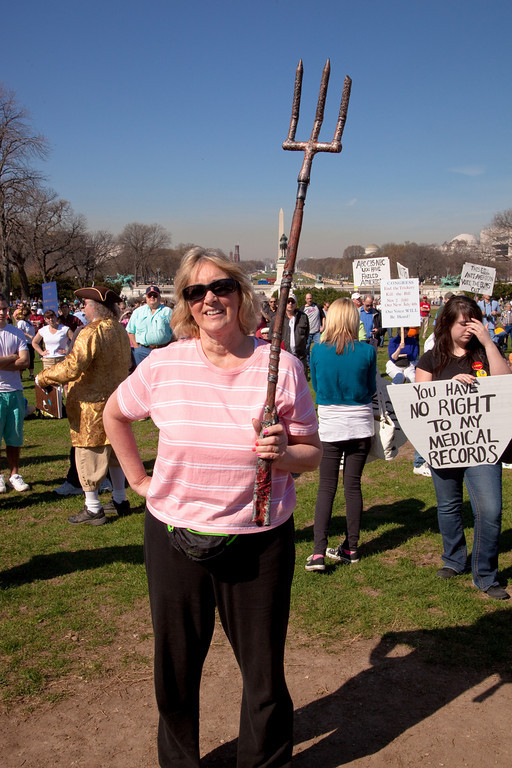A new national poll sheds some interesting light on the tea party movement. Though it confirms that the group is more white and more Republican than anything else, something other polls in the past have suggested, it also shows that your average tea partier is more likely to be a woman than an man. And she’s likely to be very angry at the government and a very big fan of Sarah Palin.
The Quinnipiac poll out this morning shows the just 13% of voters all themselves tea partiers, and those that do are on the far fringes of anger at and distrust of the government. The group is basically Republican — 77% identified themselves that way, with just 5% calling themselves independent. In a surprise, 55% are women, while just 45% are men.
Female leaders are, of course, a key component of the movement. Though Glenn Beck and other male media figures are most often thought of as crafting the ideology of the movement, the politicians the group cheers loudest for have been women since the beginning. No sitting politician has done more to associate herself with the movement than Rep. Michele Bachmann (R-MN), and no political figure is more associated with the movement’s future than Sarah Palin.
The Q poll shows that the tea partiers embrace their female political leaders almost as much as the leaders embrace the movement. While just 33% of voters overall said they had a favorable opinion of Palin, 72% of the tea partiers say they think of her favorably.
As for the gender breakdown, the 55% female majority puts the tea party movement in line with other political parties, with the exception of independents. That group is more male than female by a margin of 54-46.
Interestingly, though more tea partiers are women, men are the ones in the general population that have a positive impression of the group. Fifty-two percent of men surveyed said they like the the tea party movement, while just 48% of women did.
Other popular assumptions about the movement appear to less accurate. In the early days of the movement’s arrival on the national scene, during the health care town halls of last August, commentators said that the movement was a kind of rebellion from independent voters who voted for President Obama and then became disillusioned with his policies. It was for that reason that Democrats should fear the tea party, they said.
The poll shows that is just not the case. Only 15% of the tea partiers in the Q poll said they voted for Obama; 77% said voted for McCain. Only 16% are even nominally Democrats. That suggests, as many at tea party-style rallies will tell you, that the movement is more about a split in the GOP than it is anger at Obama.
The poll bears that out, showing that Democrats would benefit if Tea Partiers take to the ballot against mainstream party candidates. Quinnipiac’s generic congressional matchup between the Democrats and the Republicans showed the GOP leading by 5, 44-39. When a hypothetical tea party candidate was thrown into the mix, the Democrats surged ahead, winning the three-way matchup 36-25-15, with the “Tea Party” taking the lowest share of the votes (but mostly from the Republican.)
Other assumptions about the tea party movement show it defining the political debate, with most Americans paying attention. That’s not true either, according to the Q poll. While a plurality (28%) said they had a positive impression of the movement, and less than a quarter (23%) said their view was negative, most people (49%) say they “don’t know enough about the group to form an opinion.” That suggests the movement has done a good job of speaking to the angry conservative, but not a great job of defining itself to the populace at large.
That could be due to the movement’s extreme views on the government and the state of our nation. Just about half (54%) of all voters polled by Quinnipiac said that government is doing “too many things better left to businesses and individuals.” Among tea partiers, that number is 83%. Seventy percent of all voters said they are “dissatisfied” with the way things are going in the country, while 92% of tea partiers do.






